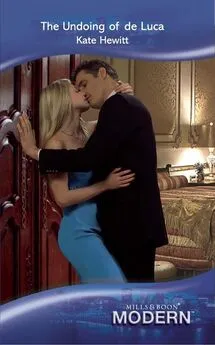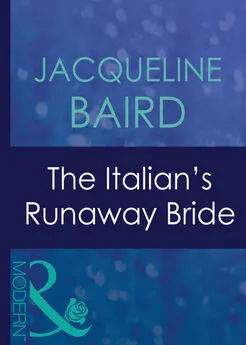Kate Hewitt - The Italian's Bought Bride
- Название:The Italian's Bought Bride
- Автор:
- Жанр:
- Издательство:неизвестно
- Год:неизвестен
- ISBN:нет данных
- Рейтинг:
- Избранное:Добавить в избранное
-
Отзывы:
-
Ваша оценка:
Kate Hewitt - The Italian's Bought Bride краткое содержание
The Italian's Bought Bride - читать онлайн бесплатно ознакомительный отрывок
Интервал:
Закладка:
She was just about to pull her coat on when she heard a voice…a voice of cool confidence and warm admiration.
A voice that slid across her senses and into her soul, stirring up those emotions and memories she’d tried so hard to lock away.
It all came rushing back with that voice… The memories, the fear, the regrets, the betrayal. She relived the worst night of her life once more, simply by hearing two little words that she knew somehow would change her world for ever.
‘Hello, Allegra,’ Stefano said.
Kate Hewittdiscovered her first Mills & Boon® romance on a trip to England when she was thirteen, and she’s continued to read them ever since. She wrote her first story at the age of five, simply because her older brother had written one and she thought she could do it too. That story was one sentence long— fortunately they’ve become a bit more detailed as she’s grown older.
She has written plays, short stories, and magazine serials for many years, but writing romance remains her first love. Besides writing, she enjoys reading, travelling, and learning to knit.
After marrying the man of her dreams—her older brother’s childhood friend—she lived in England for six years, and now resides in Connecticut with her husband, her three young children, and the possibility of one day getting a dog.
Kate loves to hear from readers—you can contact her through her website: www.kate-hewitt.com
Recent books by the same author:
RUTHLESS BOSS, HIRED WIFE
THE GREEK TYCOON’S CONVENIENT BRIDE
THE ITALIAN’S CHOSEN WIFE
THE ITALIAN’S BOUGHT BRIDE
BY
KATE HEWITT
 www.millsandboon.co.uk
www.millsandboon.co.uk
To Abby, for being a wonderful friend and confidante . You’ve seen my tears! Love, K .
CHAPTER ONE
STEFANO CAPOZZI SAT in the well-appointed office of one of Milan’s top psychiatrists, his eyes glittering in a face set like stone.
‘It has been eight months,’ he said flatly, even though Renaldo Speri had the case notes on his desk. ‘Eight months of every treatment available, imaginable, and no change.’
Speri smiled in sympathetic understanding. ‘You cannot expect a miracle cure, Signor Capozzi. You may not be able to expect a cure at all.’ He trailed off as he took in Stefano’s unrelenting gaze.
Stefano shook his head. ‘I want better.’
He would have better. He wouldn’t accept brush-offs or excuses. He’d come to Milan to find the best therapist for the child in his charge, and he would have it.
Speri ran a hand through his thinning hair and sighed. ‘Signor Capozzi, you must face the very real possibility that Lucio falls on the spectrum of pervasive development disorder—’
‘No.’ After eight months of Lucio’s silence and stress, he would not accept it. He was used to obstacles in business, and personal ones would prove no different, no more difficult. ‘Lucio was normal before his father died. He was like any other child—’
‘Autism often manifests itself at three years of age,’ Speri explained gently. ‘Lucio had only a little speech before his father’s death, and lost it completely in the months afterwards.’
Stefano raised one eyebrow in scathing scepticism. ‘And you are now trying to tell me that the two aren’t related?’
‘I am trying to tell you that it is a possibility,’ Speri said, his voice becoming strained with patience. ‘As difficult as it may be to accept.’
Stefano was silent for a moment. ‘There is no cure for autism,’ he finally said. He’d done his research. He’d read the books, seen the statistics.
‘There are therapies, diets, that alleviate some of the symptoms,’ Speri said quietly. ‘And it also depends where he falls on the spectrum—’
‘He’s not on the spectrum.’
‘Signor—’
‘I want something else.’ Stefano levelled his gaze at the psychiatrist and waited.
After a moment Speri raised his hands in a defeated gesture. ‘Signor Capozzi, we have tried therapies and grief counselling, and as you’ve reminded me, there has been no change. If anything, Lucio has descended deeper into his own iron-walled world. If this were a case of normal grief—’
‘What,’ Stefano asked icily, ‘is normal about grief?’
‘The grieving process is normal,’ Speri said steadily. ‘And accepted. But Lucio’s behaviour is not normal, and there should have been signs of improvement in communication by now. There have been none.’
On his lap, out of sight, Stefano’s hand curled into a fist. ‘I know that.’
‘Then accept that he might fall on the spectrum, and turn to the therapies and treatments that can help him best!’
Stefano was silent. Carefully, deliberately, he flattened his hand, resting it on the desktop. When Lucio’s mother, Bianca, had asked him to help, to come to Milan and tell ‘those doctors’ that her son was not autistic, Stefano had accepted. He had believed Bianca then, but now he felt the first flicker of doubt.
He would do anything for Bianca, anything for Lucio. Their family had saved him all those years ago, had pulled him up from the mire of his upbringing, giving him the steps and tools to be the man he was today.
He would never forget it.
‘Surely there is something we haven’t tried,’ he said at last. ‘Before we accept this diagnosis.’
‘The psychiatrists involved in an autism diagnosis are very thorough,’ Speri said. ‘And competent. They do not make such a judgement incautiously.’
‘Agreed,’ Stefano said tersely. ‘But still—is there something else?’
Speri was silent for a long moment. ‘There is,’ he finally said, his voice reluctant, ‘a therapist who had success with a child who’d been diagnosed with autism. Misdiagnosed, as the case turned out. He’d suffered a severe trauma the therapists working with him were unaware of, and when it was uncovered he began to regain his speech.’
Hope—treacherous, desperate—unfurled within him. ‘Then couldn’t Lucio be like that boy?’ Stefano demanded.
‘I don’t want to offer you false hope,’ Speri said, and the reluctance in his voice became more pronounced. ‘That was one case—an anomaly, a fluke—’
Stefano cut him off; he didn’t want to hear about anomalies. He wanted hope, he wanted certainty. ‘Who is this therapist?’
‘She’s an art therapist,’ Speri said. ‘Often creative therapies help children release suppressed emotions and memories, as was the case with this child. However, Lucio’s symptoms are more severe…’
‘Creative therapies,’ Stefano repeated. He didn’t like the sound of it. It sounded abstract, absurd. ‘What exactly do you mean?’
‘She uses the creative arts to provide an outlet, whether through art, song or performance, for a child’s suppressed emotions. Sometimes it is the key that can unlock a child who has been unable to be reached.’
Unlock. It was an apt word, Stefano thought, when he considered Lucio’s blank face and staring eyes. And no words. Not one word spoken in nearly a year.
‘All right, then,’ he said shortly. ‘We’ll try it. I want her.’
‘It was one case—’ Speri began, and Stefano silenced him with a raised hand.
‘I want her.’
‘She lives in London. I read of the case in a journal and we corresponded briefly, but I don’t know…’
‘She’s English?’ Disappointment sliced through him. Of what use to him—to Lucio—was an English therapist?
‘No, I wouldn’t have mentioned her if that was the case,’ Speri said with a faint smile. ‘She’s Italian, but I don’t believe she’s been back to Italy in many years.’
‘She’ll come,’ Stefano said firmly. He would make sure of it—offer whatever enticements or inducements she needed. ‘How long did she work with this other child?’
‘A few months—’
‘Then I want her in Abruzzo, with Lucio, as soon as possible.’ Stefano spoke with a finality that took the psychiatrist aback.
‘Signor Capozzi, she’ll have other patients, responsibilities—’
‘She can get rid of them.’
‘It’s not that simple.’
‘Yes,’ Stefano said flatly. ‘It is. It will be. Lucio can’t be moved; it’s too upsetting for him. She’ll come to Abruzzo. And stay.’
Speri shifted uncomfortably. ‘That will be for you to negotiate with her, of course. Such an intensive course is to be recom-mended, although there are no guarantees, but it is also costly…’
‘Money,’ Stefano replied with the barest flicker of a smile, ‘is no object.’
‘Naturally.’ Speri looked down at his notes; Stefano knew the highlights of his own CV were sketched there. Stefano Capozzi, founder of Capozzi Electronica. Liquidator of a dozen of Italy’s top electronics firms. Unrivalled.
‘I’ll give you her details,’ Speri said with a little sigh of capitulation. ‘I have the article about her and the case I mentioned here. I should tell you she’s young, quite newly qualified, relatively inexperienced, but of course that case was remarkable…’
‘That boy recovered? He spoke again?’ Stefano demanded. He didn’t like the flicker of compassion—or was it pity?—in the doctor’s eyes.
‘Yes,’ Speri said quietly, ‘he did. But it isn’t that simple, Signor Capozzi. And Lucio might be different. He might indeed be—’
‘Her details, please.’ Stefano held out his hand. He didn’t expect things to be simple. He just wanted them started .
‘Just a moment…’ Speri looked through his papers again. ‘Ah, here’s the article I mentioned.’ He smiled and handed Stefano a medical journal, opened to a folded page. ‘Here she is…a lovely photograph, don’t you think? Allegra Avesti is her name.’
Stefano didn’t hear the last part of what Speri had said, but then he didn’t need to. He knew her name. He knew her.
Or at least, he once had.
Allegra Avesti. The woman who should have been his wife, the woman he no longer knew.
His concern for Lucio fell away for a moment as he gazed at the caption: ‘Allegra Avesti, Art Therapist, with patient’. Memories swam to the surface and he forced them back down again, drowning them as his dispassionate gaze moved to the photo. He saw that she was older, thinner. She was smiling in the photo, hazel eyes glinting as she looked at the child by her side, his little fists pounding a lump of clay.
Her head was tilted to one side, her hair, a thousand shades of sunlight, piled in a careless knot, tendrils escaping to trail her cheek, her shoulder.
Her eyes sparkled and her smile was wide, encouraging, full of hope. He could almost hear the tinkling promise of pure joy. She had dimples, he saw. He’d never known. He’d never seen them. Had she not laughed like that in his presence?
Perhaps not.
He stared at the picture—the ghost of a girl he’d once known, an image of a woman he’d never met.
Allegra.
His Allegra…except she wasn’t, he knew that, had known it when he’d waited while she’d walked away. For ever.
He closed the journal, handed it back to Speri. Thought of Lucio. Only Lucio. ‘Indeed, a lovely picture,’ he said without any intonation or expression. The look of joy and hope on Allegra’s face would be an inspiration to many a fearful and weary parent, seeking answers for their child. ‘I shall contact her.’
Читать дальшеИнтервал:
Закладка:










